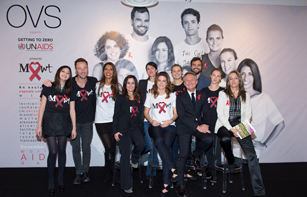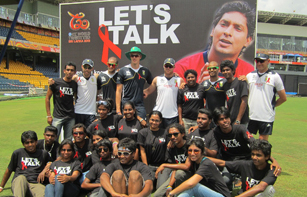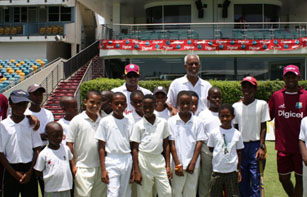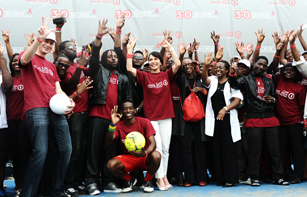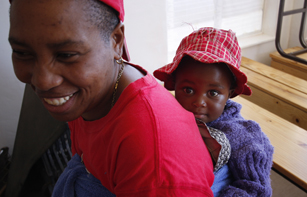
CARMMA aims to accelerate the implementation of activities to stem maternal and child mortality.
The distinctive cry of a new-born baby pierces the air in the labour ward and stops conversation in its tracks. "That’s what we want to hear" remarks Sister Mavimbela, who just hours ago delivered him into the world. “When a baby cries, that’s the sign of a healthy delivery,” she says with the quiet confidence of someone who knows.
Unfortunately, it is not a cry that is heard every time as South Africa struggles with a high rate of maternal and child mortality. The country has a maternal mortality ratio of 310 deaths per 100 000 live births and an under-five mortality rate of 56 deaths per 1 000 live births. To reduce this, the campaign on Accelerated Reduction of Maternal Mortality in Africa (CARMMA) was launched at Osindisweni Hospital in Ethekwini District, KwaZulu-Natal Province on Friday 4 May.
CARMMA aims to accelerate the implementation of activities to stem maternal and child mortality and meet Africa’s targets for Millennium Development Goals four and five—to reduce by three quarters the maternal mortality rate and to reduce by two thirds the child mortality rate between 1990 and 2015.
Health care workers at Osindisweni Hospital are certain about what is needed to help achieve these targets: reduce the burden of HIV. They are supported by the numbers. South African data shows that 50% of maternal deaths and 40% of under-five deaths are as a result of HIV infection.
“We didn’t experience problems like this when I started”, says Sister Phumzile Kwitshana, who has been practicing as a midwife for 24 years. “It has gotten worse because of HIV—now mothers are sick.”
Dr. Amina Kajee, a doctor in the maternity ward at Osindisweni agrees. “The last two cases of maternal deaths under my care were due to clinically advanced HIV. In one case one of the twins survived, the other didn’t. She only weighed 900 grams.”
The policy framework already exists: offer every pregnant woman HIV testing and counselling under the auspices of the national prevention of mother-to-child (PMTCT) programme. If she tests positive for HIV initiate her onto a regime of highly active anti-retroviral therapy to avoid transmitting the virus to her baby and ensure she is offered a continuum of treatment, care and support for herself and her infant.
However, one of the major obstacles to rolling out the policy successfully is that women often present for antenatal care too late in pregnancy for them to be offered the appropriate care. The overriding factor to explain this seems to be fear or lack of information, or a mixture of both.
The launch was a stark reminder of the hard work we need to do to achieve the third target of the Political Declaration on HIV/AIDS: Eliminate new HIV infections among children by 2015 and reduce maternal deaths
UNAIDS Regional Director for Eastern and Southern Africa, Professor Sheila Tlou
“Women either don’t know or don’t want to know,” is how Dr. Kagee explains it.
“Women don’t come to the clinic because they don’t want to disclose to their families or partners… Sometimes it is the attitude of health care workers with the young ones,” says Sister Kwitshana, referring to the disapproval that often meets a teenage mother, sometimes discouraging her from returning. “Some of them just hide their pregnancies until late.”
Health care workers cite other challenges—some seemingly minor administrative issues, such as the need for a dedicated ambulance on standby for maternity cases, so that women at risk can get to hospital before the crisis deepens. In resource poor settings, however, minor challenges easily become major obstacles. These are further compounded by substantial health system challenges. For example, more midwives are needed to address understaffing and they require ongoing training and values clarification.
Nevertheless, the conversation returns to the issue of women themselves. “We need to shake up the community” says Sister Kwitshana.
Community mobilization campaigns are needed to encourage women to present early for antenatal care. Communities should be the bearers of information to prevent unintended pregnancies, especially among HIV positive women and teenagers, and to reduce HIV stigma.
The launch was led by South Africa’s Minister of Health, Dr Aaron Motsoaledi and was attended by a number of dignitaries and celebrities, including the Minister of Women, Children and People with Disabilities, Ms Lulama Xingwana, Advocate Bience Gawanas, the African Union Commissioner for Social Affairs, the Premier of KwaZulu-Natal, Dr Zweli Mkhize, musical icon and UNICEF Goodwill Ambassador, Yvonne Chaka Chaka, Mrs Graça Machel and UNAIDS Regional Director of the Regional Support Team for Eastern and Southern Africa, Professor Sheila Tlou.
“The launch was a stark reminder of the hard work we need to do to achieve the third target of the Political Declaration on HIV/AIDS: Eliminate new HIV infections among children by 2015 and reduce maternal deaths,” says Professor Tlou. “One death is a death too many.”




